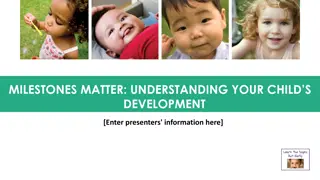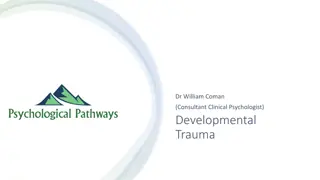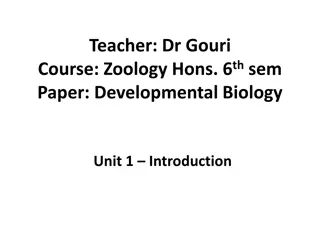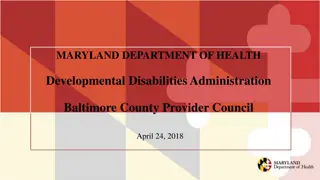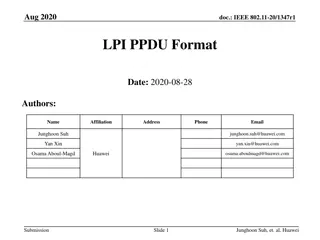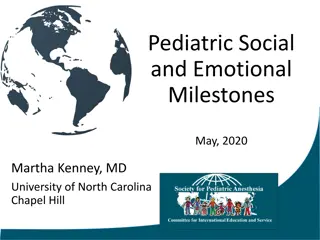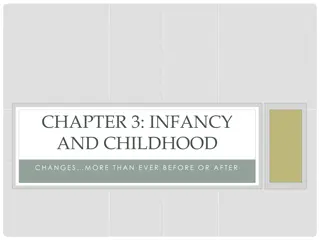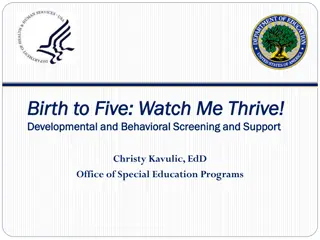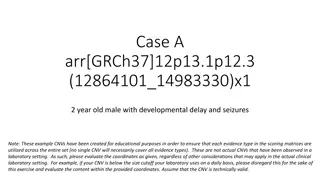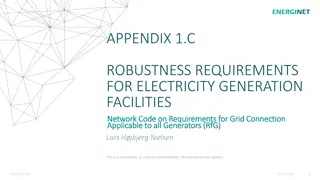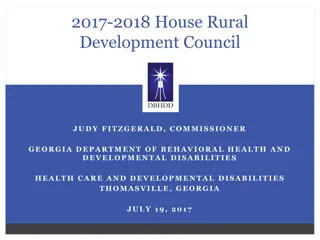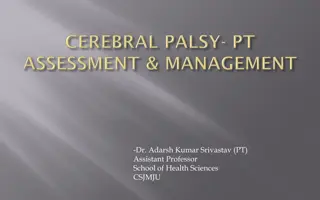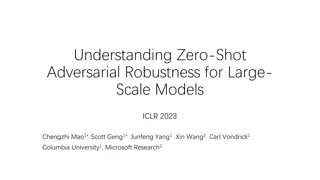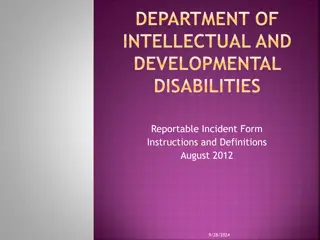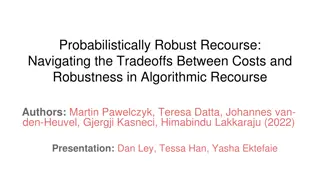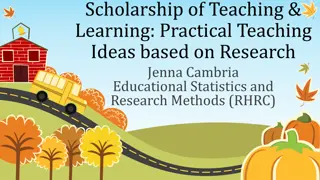Exploring Robustness and Developmental Systems: A Workshop Overview
Delve into the intricate world of developmental systems and robustness with insights from Paul E. Griffiths. Discover the evolution of developmental processes, the significance of epigenetics, and the interplay between genotypes and phenotypes. Gain a deeper understanding of epigenetic inheritance and the role of genes in shaping developmental events. Join the discourse at the upcoming workshop in Bordeaux for a comprehensive exploration of these critical concepts.
Uploaded on Sep 12, 2024 | 0 Views
Download Presentation

Please find below an Image/Link to download the presentation.
The content on the website is provided AS IS for your information and personal use only. It may not be sold, licensed, or shared on other websites without obtaining consent from the author. Download presentation by click this link. If you encounter any issues during the download, it is possible that the publisher has removed the file from their server.
E N D
Presentation Transcript
Beyond canalisation: robustness in developmental systems Paul E. Griffiths 12/09/2024 Robustness workshop, Bordeaux 1
Developmental systems An animal is, in fact, a developmental system, and it is these systems, not the mere adult forms which we conventionally take as typical of the species, which becomes modified during the course of evolution. Waddington, The Evolution of Developmental Systems 1952, p.155 & Fig 1 12/09/2024 Robustness workshop, Bordeaux 2
12/09/2024 Robustness workshop, Bordeaux 3
Senses of Epigenetic Epigenesis: the idea that the outcomes of development are created in the process of development, not preformed in the inputs to development; epigenetic can be used in this sense Epigenetics (broad sense Waddington 1942): the study of the causal mechanisms by which genotypes give rise to phenotypes; the integration of the effects of individual genes in development to produce the epigenotype Epigenetics (narrow sense Nanney 1958): the study of the mechanisms that determine which genome sequences will be expressed in the cell; the control of cell differentiation and of mitotically and sometimes meiotically heritable cell identity Epigenetic inheritance (narrow sense): the inheritance of genome expression patterns across generations (e.g. through meiosis) in the absence of a continuing stimulus Epigenetic inheritance (broad sense): the inheritance of phenotypic features via causal pathways other than the inheritance of nuclear DNA. We refer to this as exogenetic inheritance (West and King 1987) (from Griffiths and Stotz 2013) 12/09/2024 Robustness workshop, Bordeaux 4
The Epigenotype "For the purpose of a study of inheritance, the relation between phenotypes and genotypes can be left comparatively uninvestigated; we need merely to assume that changes in the genotype produce correlated changes in the adult phenotype, but the mechanism of this correlation need not concern us. Yet this question is, from a wider biological point of view, of crucial importance, since it is the kernel of the whole problem of development" Waddington, The Epigenotype 2012 [1942], 10. " the genotype is [in] continual and unremitting control of every phase of development. Genes are not interlopers, which intrude from time to time to upset the orderly course of a process which is essentially independent of them; on the contrary, there are no developmental events which they do not regulate and guide" Waddington, 2012 [1942], 12. 12/09/2024 Robustness workshop, Bordeaux 5
Beyond the epigenotype Once nurturing -- that is, development -- is accepted as an ineliminable and integral part of biological nature, it can no longer be contrasted with nature. It cannot represent, for instance, an environmental "outside" to an inherited "inside Susan Oyama, The Nurturing of Natures (2002) 12/09/2024 Robustness workshop, Bordeaux 6
Senses of Epigenetic Epigenesis: the idea that the outcomes of development are created in the process of development, not preformed in the inputs to development; epigenetic can be used in this sense Epigenetics (broad sense Waddington 1942): the study of the causal mechanisms by which genotypes give rise to phenotypes; the integration of the effects of individual genes in development to produce the epigenotype Epigenetics (narrow sense Nanney 1958): the study of the mechanisms that determine which genome sequences will be expressed in the cell; the control of cell differentiation and of mitotically and sometimes meiotically heritable cell identity Epigenetic inheritance (narrow sense): the inheritance of genome expression patterns across generations (e.g. through meiosis) in the absence of a continuing stimulus Epigenetic inheritance (broad sense): the inheritance of phenotypic features via causal pathways other than the inheritance of nuclear DNA. We refer to this as exogenetic inheritance (West and King 1987) (from Griffiths and Stotz 2013) 12/09/2024 Robustness workshop, Bordeaux 7
The ontogenetic niche genes inherit a rich and supportive environment The niche is a legacy bequeathed to progeny and responsible for the diverse but dependable influences on the developing organism. West, M. J., & King, A. P. (1987). Brown-headed cowbird (Molothrus Ater) Meredith West image 12/09/2024 Robustness workshop, Bordeaux 8
Extending Waddingtons model Coding and non-coding regions of the genome, epigenetic and exogenetic factors can all be represented as variables in a causal graph Their influence on phenotypic outcomes can be measured using causal information theory measures such as specificity (Griffiths et al 2015, Pocheville et al 2017) or information flow (Ay and Polani 2008) Brett Calcott has presented Waddington s ideas using this formalism 12/09/2024 Robustness workshop, Bordeaux 9
Causal information theory can be used to quantify Waddingon s ideas Calcott, Brett. Causal Specificity and the Instructive-Permissive Distinction. Biology and Philosophy 32, no. 4 (July 2017): 481 505. 12/09/2024 Robustness workshop, Bordeaux 10
Causal information theory can be used to quantify Waddingon s ideas Calcott, Brett. Causal Specificity and the Instructive-Permissive Distinction. Biology and Philosophy 32, no. 4 (July 2017): 481 505. 12/09/2024 Robustness workshop, Bordeaux 11
Is the extended model useful? Problems Need to represent all causes as discrete variables to use information theory highly artificial Features of low dimensional landscapes can t be generalised to high-dimensional But these concerns probably apply as much to Waddington s original model 12/09/2024 Robustness workshop, Bordeaux 12
Reservations about canalisation [learnt/innate] does have some value in placing behaviors on a lability continuum, with some behaviors more nurture dependent, more changeable and variable, and others more nature dependent, more stereotyped and resistant to change. (Marler, 2004, 31) Why assume that dimension reduction like this is possible? Song sparrows and cowbirds a cautionary tale 12/09/2024 Robustness workshop, Bordeaux 13
Reservations about canalisation Showing that a trait is insensitive to changes in one or a few parameters ( pegs in Waddington s diagram) is very far from showing that it is canalized in a high-dimensional model There is no general evolutionary rationale for extrapolating canalization-relative-to-a-parameter from one dimension to others Classifying two different traits as both canalized because they fail to respond to different environmental manipulations is hardly better than classifying them together because one is not very large, another is not very rigid, and a third is not very heavily pigmented (Griffiths and Machery 2008) 12/09/2024 Robustness workshop, Bordeaux 14
Conclusion Arguably, the assumption that extrapolating canalization-relative-to-a-parameter from one dimension to others is a reasonable inference is an expression of psychological essentialism about biological kinds We should not trust our intuitions about canalization based on Waddington s attractive image of the developmental landscape 12/09/2024 Robustness workshop, Bordeaux 15
Acknowledgments 2017 Theory and Methods in Bioscience Group Charles Perkins Centre www.griffithslab.org Griffiths, P. E. and J. G. Tabery (2013) Developmental Systems Theory: What Does it Explain, and How Does It Explain It? In R. M. Lerner and J. B. Benson(Eds), Embodiment and Epigenesis: Advances in Child Development and behavior Vol. 45. Griffiths, Paul E. Genetic, Epigenetic and Exogenetic Information in Development and Evolution. Interface Focus 7 (2017). Griffiths, Paul E, and Edouard Machery. Innateness, Canalisation and Biologicizing the Mind. Philosophical Psychology 21 (2008) 12/09/2024 Robustness workshop, Bordeaux 16
12/09/2024 Robustness workshop, Bordeaux 17


